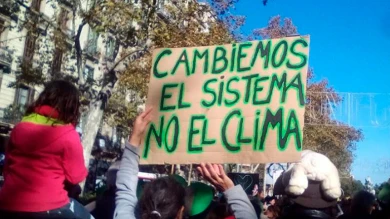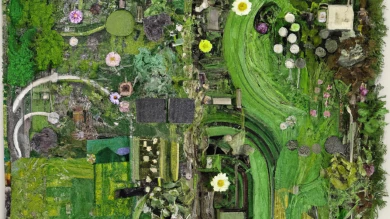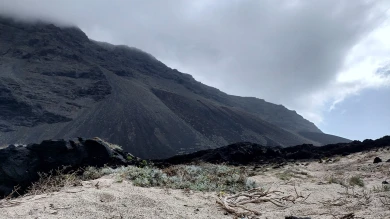-
Friday, 5 May 2023 Ateneo La Maliciosa (calle de las Peñuelas 12, Madrid)
Common Readings: Crisis, Social Reproduction, Self-management
Encounter
— With the participation of the collectives Red Artea - Artea Sarea, Rojava Azadi and Seminario de Entramados Comunitarios y Formas de lo Político (BUAP)
This conversation is centred around three main objectives: the relationship between the eco-social crisis, the crisis of the reproduction of life and territory struggles. It links these issues with the need to build independent frameworks which uphold social reproduction collectively, and delves deeper into the transversality of different forms of violence and the need to think about our projects from an anti-punitive feminist perspective.
-
Saturday, 6 May 2023 Museo Reina Sofía, Nouvel Building, Auditoriums, Lobby
Common Strategies: Sharing, Imagining, Conspiring
Encounter and Workshop
The first part of this day set up for collectives and organisations gets under way with groups formed to reflect upon four points: social reproduction, spaces of self-management and communities, conflicts and self-management and income, employment and popular institutions. In the afternoon, a plenary discussion will be held, revolving around the ideas developed throughout the day during the work-table sessions, with the goal of generating a space of continuity in the process carried out and with the networks that have arisen.
-
Sunday, 7 May 2023 Ateneo La Maliciosa (calle de las Peñuelas 12, Madrid)
Common Routes: Proposals and Times on the Road to Re-captivating the World
Day of Conclusions
This final encounter, in the form of a plenary assembly between participants, gathers the conclusions and specific work proposals to think jointly about the next steps to keep on making these structured strategic spaces for struggles and sustaining life possible.

Held on 05, 06, 07 May 2023
Utopias and Revolts. Composing Strategies from the Collective is a series of encounters which, from a public round table and different work sessions, reflects upon strategies to deal with present-day challenges related to eco-social crises and sustaining life. Therefore, collectives and associations involved in social movements that include transfeminism, rights (domestic workers, housing, care, sexual rights), the struggles of migrant people, and other movements, are brought together here.
In November 2022, a space of exchange was opened between different state collectives and organisations from the research process developed by the territorial nodes of the Foundation of the Commons, resulting in the course The Future Is Unwritten. Organisation in the Capitalocene Crisis, followed by the encounter Capitalocene Utopias. Eco-Social Crisis: Definition, Challenges and Strategic Proposals, organised jointly with the Museo Reina Sofía. Their conclusions give rise to the following reflection: the current eco-social crisis cannot be reduced to environmental factors and must encompass financial, geopolitical, social and energy causes which run in parallel.
Some of the questions raised during this new encounter are: Which new commons can be generated (or are already being created) to oppose new forms of enclosure? How can food, housing, health, training and social security needs be resolved outside the wage system? What does it mean to defend the social reproduction of life amid renewed dynamics of dispossession, devastation and reorganisation of life?
To respond collectively, through a transversal prism, to these and other questions, the encounter has been designed as a working space shared between different nodes of the Foundation of the Commons — La Hidra Cooperativa, Katakrak, Synusia and Traficantes de Sueños — alongside fellow workers from collectives and organised spaces in different spheres of struggle and in collaboration with the Museo Reina Sofía.
[dropdown]
Red Artea - Artea Sarea is a self-managed project that was set up in 2016 in the municipality of Artea (Bizkaia-Vizcaya) as a space of asylum and solidarity, and as a place to welcome migrant families and people in order to defend food sovereignty and rights for working migrant people.
Rojava Azadi is a Madrid-based collective of people with an interest in making visible and supporting emancipatory struggles being carried out in Kurdistan, particularly the process in the Rojava social revolution and the model of democratic self-governance they put forward. Their aim is to foster debate and collective reflection, as well as strengthening communication and international solidarity, weaving support networks to facilitate fellowship between peoples and social mobilisation.
Seminario de Entramados Comunitarios y Formas de lo Político (The Seminar of Community Frameworks and Forms of the Political) is a permanent research space based in the “Alfonso Vélez Pliego” Institute of Social Sciences and Humanities at the Benemérita Universidad Autónoma de Puebla (BUAP) in Mexico. The seminar serves to put forward reflections around the notion of the commons, the deployment of social antagonisms from the anti-patriarchal vein of the anti-capitalist struggle and the reading of new flows of struggles that women are driving forward from Latin America and Europe.
[/dropdown]
Organised by
Museo Reina Sofía and Fundación de los Comunes
Organised by

Participants
Participants
Más actividades
![Tracey Rose, The Black Sun Black Star and Moon [La luna estrella negro y negro sol], 2014.](https://recursos.museoreinasofia.es/styles/small_landscape/public/Obra/AD07091_2.jpg.webp)
On Black Study: Towards a Black Poethics of Contamination
Monday 27, Tuesday 28 and Wednesday 29 of April, 2026 – 16:00 h
The seminar On Black Study: Towards a Black Poethics of Contamination proposes Black Study as a critical and methodological practice that has emerged in and against racial capitalism, colonial modernity and institutional capture. Framed through what the invited researcher and practitioner Ishy Pryce-Parchment terms a Black poethics of contamination, the seminar considers what it might mean to think Blackness (and therefore Black Study) as contagious, diffuse and spreadable matter. To do so, it enacts a constellation of diasporic methodologies and black aesthetic practices that harbor “contamination” -ideas that travel through texts, geographies, bodies and histories- as a method and as a condition.
If Blackness enters Western modernity from the position of the Middle Passage and its afterlives, it also names a condition from which alternative modes of being, knowing and relating are continually forged. From within this errant boundarylessness, Black creative-intellectual practice unfolds as what might be called a history of touches: transmissions, residues and socialities that unsettle the fantasy of pure or self-contained knowledge.
Situated within Black radical aesthetics, Black feminist theory and diasporic poetics, the seminar traces a genealogy of Black Study not as an object of analysis but as methodological propositions that continue to shape contemporary aesthetic and political life. Against mastery as the horizon of study, the group shifts attention from what we know to how we know. It foregrounds creative Black methodological practices—fahima ife’s anindex (via Fred Moten), Katherine McKittrick’s expansive use of the footnote, citation as relational and loving labour, the aesthetics of Black miscellanea, and Christina Sharpe’s practices of annotation—as procedures that disorganise dominant regimes of knowledge. In this sense, Black Study is approached not as a discrete academic field but as a feel for knowing and knowledge: a constellation of insurgent practices—reading, gathering, listening, annotating, refusing, world-making—that operate both within and beyond the university.
The study sessions propose to experiment with form in order to embrace how ‘black people have always used interdisciplinary methodologies to explain, explore, and story the world.’ Through engagements with thinkers and practitioners such as Katherine McKittrick, C.L.R. James, Sylvia Wynter, Christina Sharpe, Fred Moten, Tina Campt, Hilton Als, John Akomfrah, fahima ife and Dionne Brand, we ask: What might it mean to study together, incompletely and without recourse to individuation? How might aesthetic practice function as a poethical intervention in the ongoing work of what Sylvia Wynter calls the practice of doing humanness?

Intergenerationality
Thursday, 9 April 2026 – 5:30pm
This series is organised by equipoMotor, a group of teenagers, young people and older people who have participated in the Museo Reina Sofía’s previous community education projects, and is structured around four themed blocks that pivot on the monstrous.
The third session gazes at film as a place from which to dismantle the idea of one sole history and one sole time. From a decolonial and queer perspective, it explores films which break the straight line of past-present-future, which mix memories, slow progress and leave space for rhythms which customarily make no room for official accounts. Here the images open cracks through which bodies, voices and affects appear, disrupting archive and questioning who narrates, and from where and for whom. The proposal is at once simple and ambitious: use film to imagine other modes of remembering, belonging and projecting futures we have not yet been able to live.

Remedios Zafra
Thursday March 19, 2026 - 19:00 h
The José Luis Brea Chair, dedicated to reflecting on the image and the epistemology of visuality in contemporary culture, opens its program with an inaugural lecture by essayist and thinker Remedios Zafra.
“That the contemporary antifeminist upsurge is constructed as an anti-intellectual drive is no coincidence; the two feed into one another. To advance a reactionary discourse that defends inequality, it is necessary to challenge gender studies and gender-equality policies, but also to devalue the very foundations of knowledge in which these have been most intensely developed over recent decades—while also undermining their institutional support: universities, art and research centers, and academic culture.
Feminism has been deeply linked to the affirmation of the most committed humanist thought. Periods of enlightenment and moments of transition toward more just social forms—sustained by education—have been when feminist demands have emerged most strongly. Awareness and achievements in equality increase when education plays a leading social role; thus, devaluing intellectual work also contributes to harming feminism, and vice versa, insofar as the bond between knowledge and feminism is not only conceptual and historical, but also intimate and political.
Today, antifeminism is used globally as the symbolic adhesive of far-right movements, in parallel with the devaluation of forms of knowledge emerging from the university and from science—mistreated by hoaxes and disinformation on social networks and through the spectacularization of life mediated by screens. These are consequences bound up with the primacy of a scopic value that for some time has been denigrating thought and positioning what is most seen as what is most valuable within the normalized mediation of technology. This inertia coexists with techno-libertarian proclamations that reactivate a patriarchy that uses the resentment of many men as a seductive and cohesive force to preserve and inflame privileges in the new world as techno-scenario.
This lecture will address this epochal context, delving into the synchronicity of these upsurges through an additional parallel between forms of patriarchal domination and techno-labor domination. A parallel in which feminism and intellectual work are both being harmed, while also sending signals that in both lie emancipatory responses to today’s reactionary turns and the neutralization of critique. This consonance would also speak to how the perverse patriarchal basis that turns women into sustainers of their own subordination finds its equivalent in the encouraged self-exploitation of cultural workers; in the legitimation of affective capital and symbolic capital as sufficient forms of payment; in the blurring of boundaries between life and work and in domestic isolation; or in the pressure to please and comply as an extended patriarchal form—today linked to the feigned enthusiasm of precarious workers, but also to technological adulation. In response to possible resistance and intellectual action, patriarchy has associated feminists with a future foretold as unhappy for them, equating “thought and consciousness” with unhappiness—where these have in fact been (and continue to be) levers of autonomy and emancipation.”
— Remedios Zafra

ARCO2045. The Future, for Now
Saturday 7, March 2026 - 9:30pm
The future, its unstable and subjective nature, and its possible scenarios are the conceptual focus of ARCOmadrid 2026. A vision of the future linked to recent memory, a flash of insight into a double-edged sword. This year's edition, as in the previous two, will once again hold its closing party at the Reina Sofia Museum. This time, the star of the show is Carles Congost (Olot, Girona, 1970), one of the artists featured in the new presentation of the Collections recently inaugurated on the 4th floor of the Sabatini Building.
Carles Congost, with his ironic and timeless gaze, is responsible for setting the tone for this imperfect future, with a DJ session accompanied by some of his works in the Cloister on the first floor of the Sabatini Building of the Museo on the night of Saturday 7 March.

27th Contemporary Art Conservation Conference
Wednesday, 4, and Thursday, 5 March 2026
The 27th Contemporary Art Conservation Conference, organised by the Museo Reina Sofía’s Department of Conservation and Restoration, with the sponsorship of the Mapfre Foundation, is held on 4 and 5 March 2026. This international encounter sets out to share and debate experience and research, open new channels of study and reflect on conservation and the professional practice of restorers.
This edition will be held with in-person and online attendance formats, occurring simultaneously, via twenty-minute interventions followed by a five-minute Q&A.




